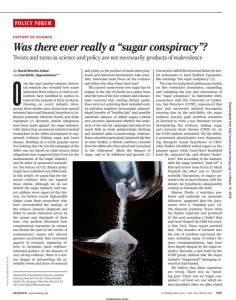Join getAbstract to access the summary!

Join getAbstract to access the summary!
David Merritt Johns and Gerald M. Oppenheimer
Was There Ever Really a “Sugar Conspiracy”?
Twists and turns in science and policy are not necessarily products of malevolence
Science, 2018
What's inside?
How “Big Sugar” got a black eye for influencing people’s diets, when other food producers were doing the same.
Recommendation
The debate over the harmful effects of dietary fat, cholesterol and sugar dates back to the 1960s. The term “sugar conspiracy” caught fire when a Harvard review debunking sugar’s role in the explosion of coronary heart disease and obesity in the United States was revealed to be secretly funded by the sugar industry. However, many powerful food producers have backed influential nutritional studies since World War II. People who distrust the process and purpose of large nutritional studies, and question their results, may want to read this.
Summary
About the Authors
Gerald M. Oppenheimer is a historian of public health at City University of New York’s School of Public Health. David Merritt Johns is a doctoral student at the Center for the History and Ethics of Public Health at Columbia University.

















Comment on this summary